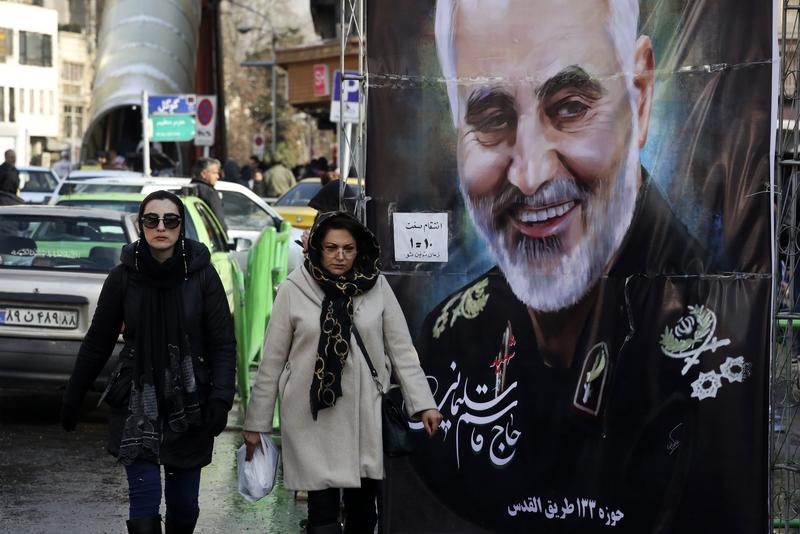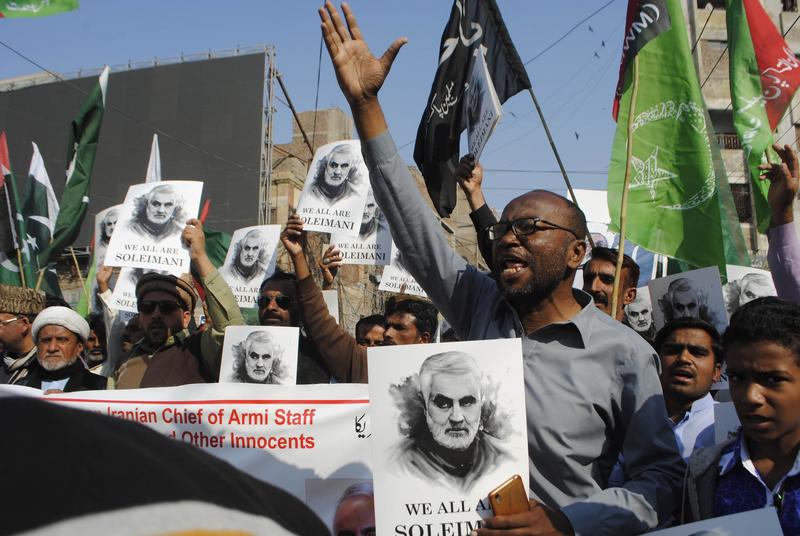 In this Jan 9, 2020, file photo, women walk past a banner of Iranian Revolutionary Guard Gen. Qassem Soleimani, who was killed in Iraq in a US drone attack, in Tehran, Iran. (Vahid Salemi / AP)
In this Jan 9, 2020, file photo, women walk past a banner of Iranian Revolutionary Guard Gen. Qassem Soleimani, who was killed in Iraq in a US drone attack, in Tehran, Iran. (Vahid Salemi / AP)
BAGHDAD — A month after a US missile killed him, Qassem Soleimani looms as large over Iraq’s fractured democracy as he ever did alive.
The death of the Iranian general removed a shrewd guiding hand on the pro-Tehran Shi’ite militias who revered him, setting off a menacing new instability in Iraq’s fragile political arena.
There is mounting Iraqi determination to reject the increasing Iranian influence and this is what we are seeing in the protests
a prominent Iran-aligned Shi’ite party leader
Now the shadowy power structure he helped to build — a state above the state made up of Iraq’s formal institutions — risks colliding ever more bloodily with a powerful youth-led anti-Iranian protest movement.
That in turn poses a quandary for Iraq’s leaders, torn by a choice between Iranian tutelage and meeting the demands of a generation seeking an end to Iran’s dominance.
They know that if they tilt too far towards Tehran they risk worse political turmoil and Iraq written off as a failed state, analysts and diplomats say.
“There is mounting Iraqi determination to reject the increasing Iranian influence and this is what we are seeing in the protests,” said a prominent Iran-aligned Shi’ite party leader, who declined to be identified.
“The Iranians should review their policies if they want to build good relations with Iraq.”
While Soleimani’s death weakens Iran, it also leaves a damaging security vacuum in Iraq because the veteran commander held final sway over Tehran’s Iraqi paramilitary forces.
Analysts and diplomats fear the absence of his seasoned leadership, and his ability to dial militias up and down, could result in an Iraq with the paramilitary equivalent of a Frankenstein’s monster on the loose.
One of the most powerful Iraqi paramilitary leaders, Abu Mahdi al-Muhandis, a close Soleimani confidant, died in the same US drone strike on Jan. 3. Fear and uncertainty among his fellow militia chieftains has sent many of them into hiding, changing residence and even phone numbers.
“Even Soleimani and Muhandis found it hard at times to keep Kataib Hezbollah (the militia founded by Muhandis) under control and there’s now a stronger possibility they might act on their own,” says one Western envoy to Baghdad.
In Iraq, months-long protests against political elites and their Iranian patrons continue, having forced the resignation of the prime minister, an important position of formal power alongside the 329-seat parliament and the president.
But the protests have made no change to the pro-Iranian paramilitary groups. Estimated to number up to 160,000 men in total, these groups are built around a core of militias founded, trained, armed and ideologically loyal to Iran.
 Pakistani Muslims demonstrate over the US airstrike in Iraq that killed Iranian Revolutionary Guard Gen. Qassem Soleimani, in Hyderabad, Pakistan, Jan 24, 2020. (PERVEZ MASIH / AP)
Pakistani Muslims demonstrate over the US airstrike in Iraq that killed Iranian Revolutionary Guard Gen. Qassem Soleimani, in Hyderabad, Pakistan, Jan 24, 2020. (PERVEZ MASIH / AP)
PROXY WAR ON IRAQI SOIL
Some of those militias have abused their increased power to shoot dozens of demonstrators, whose protests against corruption and incompetence have won the endorsement of Grand Ayatollah Ali al-Sistani, Iraq’s paramount religious authority.
“The militias became monsters, greedy and too powerful to handle,” says a senior politician with long experience of trying to govern Iraq. “They extorted money from businesses, they wanted their share from everything, even forcing the government to give their loyalists jobs and state contracts.”
A leading Iraqi politician says Soleimani’s power by the end was so great he behaved like a viceroy on his visits, convening not just allies but forces from across the spectrum.
While both Iran and Iraq worry about the risk of a full-on conflict between Iraqi Shi’ite forces and youths indignant at Tehran’s domination of their country, there is also fear that Iraq may become a war zone between Iran and the United States.
Unlike in most of the Arab world, Shi’ites are a majority in Iraq, propelled into power by the US-led invasion of 2003 that toppled the minority Sunni dictatorship of Saddam Hussein.
Through subsequent civil war, with sectarian rival elites looting the state, that majority has failed to build cohesion around the power-sharing with the Sunni Arabs and self-governing Kurdish minority decreed by a 2003 post-war constitution.
The last round of civil war, against Islamic State’s (IS) short-lived caliphate, was a huge leap forward for Iran’s Iraqi militias, which performed much more strongly than the country’s military, US-trained but hollowed out by corruption.
Grouped inside the umbrella of the Popular Mobilisation Forces (PMF) or al-Hashid al-Shaabi, they formed after an edict by Sistani and helped turn the Sunni jihadi tide. A spokesman for the PMF could not immediately be reached for comment.
RISING ANTI-IRAN SENTIMENT
Anti-Iran sentiment among the activists encamped in Baghdad’s Tahrir Square since October runs high.
While they did finally topple Abdul-Mahdi – replaced on Saturday by Prime Minister Mohammed Tawfiq Allawi – they want an independent government free of foreign and especially Iranian tutelage, and to hold the killers of protesters accountable.
Protesters highlight how Iran has flooded the Iraqi market with its own goods, from electronic equipment, to furniture, cars, as well as dairy and agricultural products.
“All the goods in the market are Iranian, they killed our economy. Our politicians and militias are stooges for Iran, they gave them import licences for all this. Iraq used to feed all nearby countries with its agricultural products and now it’s all gone,” said Abbas Roweih, 23, an unemployed medical technician.
The Shi’ite party leader argues that the future of an Iraq with a young population – half under 17 and who never knew Saddam’s tyranny – lies with the protesters and their rage.
“The young Iraqi democracy needed an earthquake to address the demands of these youths,” said the leader.
HIGH STAKES FOR IRAQ
Despite his close links to Iran, this leader says that even politicians close to the Shi’ite-dominated government and the PMF believe the militias have become a state above the state.
He said prime minister Abdul-Mahdi was taken by surprise when in December militia-instigated anti-US protests that followed air raids on Kataib Hezbollah targets turned into a siege of the US embassy and reached its gates.
ALSO READ: Ayatollah: US assassination of Soleimani act 'cowardice'
When Abdul Mahdi could not reach militia leaders during the siege who had switched off their phones, he sent someone from his office with an open phone line to them and asked them to withdraw from the embassy site, the leader said. They did not.
Many observers and analysts believe it was TV footage of Iraqi militiamen breaching the perimeter of the Baghdad embassy – a throwback to the American trauma of the hostage crisis at the US embassy in Tehran of 1979 – that triggered President Donald Trump’s decision to order the attack on Soleimani.
“We don’t want to be enemies of Iran but we want relations to be based on mutual respect and for (Iran) not to use Iraq in proxy wars with the United States,” warns the party leader.
Iraq’s problems don’t end there.
One is that Iranian proxy forces in Iraq follow Iran’s doctrine of Velayat al-Faqih (Guardianship of the Jurisprudent) that vests ultimate authority in the Supreme Leader, Ayatollah Ali Khamenei. This notion is foreign to Sistani and other top Iraqi clerics who believe it mires religion in politics.
READ MORE:Pompeo: Soleimani killing part of new strategy to deter US foes
Diplomats believe Iraq could pay economically for enacting Iran’s agenda: If Iran does manage to prevail upon Iraq to force out the 5,000 US troops, this might lead Washington to sanction its economy and leaders, diplomatic sources say. Iraq’s parliament has already voted to expel US troops.
Many diplomats doubt the will and ability of Iraq’s fractious, disunited political class to avoid this outcome.
“If the Iraqi government acts to have foreign forces withdraw ... then there are probably all sorts of consequences,” said a US official.


